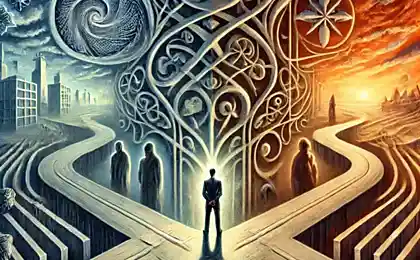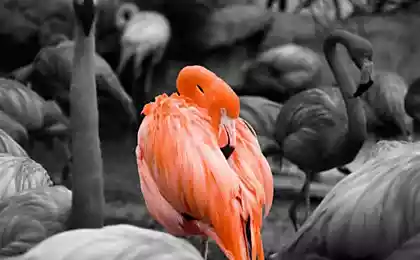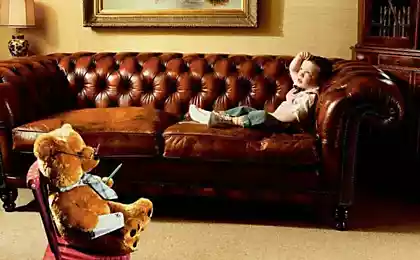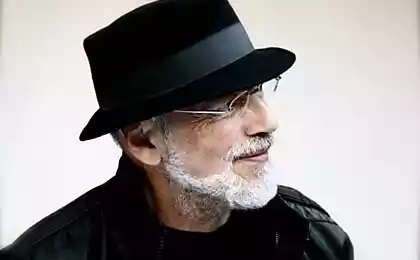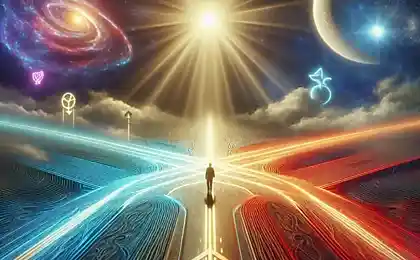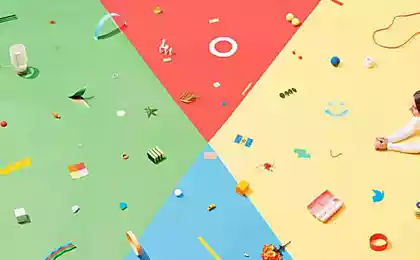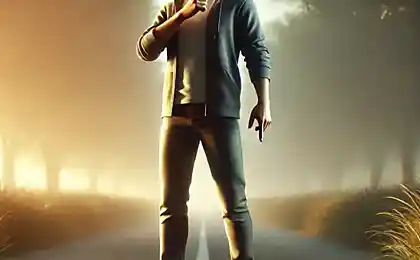492
By choosing the goal, don't become a target
How do we make decisions? Is there an optimal technology adoption? Is it possible to make decisions correct, not "God blesses"?
For this reason constantly debate between supporters of intuition and reason. The first claim that it is necessary to go on about the heart, the second that to make decisions is only in your mind. First consider the second heartless, the second first – silly romance.

And where is the truth?
It makes sense to use both approaches. But to do it at the same time difficult. Live in one and the same time, and mind, and heart is a very energy-intensive, requires huge voltage. When a man feels keenly to get him while still thinking almost impossible: the hormonal storm going on here and do not get to indulge in quiet reflection.
But to use alternately both approaches are quite real. First apply to the solution of an intellectual approach: what would you do, on the basis of rational calculation? And then to listen to my intuition to determine their attitude to the decision.
The truth is in dynamic balance, the concerted action of mind and heart. In passing along the edge of common sense and not slip, on the one hand, in heart failure, and with another – not to become a prisoner of the arrogant mind.
TTrinity of consciousness
Usually the intuition comes to help us in those moments when we can't get reliable rational information. Correct and intuitive solution arises only when we have taught ourselves to listen and trust the inner signals that come through bodily sensations.
In order to respond adequately and appropriately to make decisions not only need to mentally analyze the situation, but also to understand which bodily sensations and emotions associated with this situation. This triumvirate and called awareness. Just being conscious, you will be able to live with your heart in accord with reason.
"The unhappy fate of many people – a consequence not of their choice. They are neither alive nor dead. Life is a burden, pointless occupation, and the case – only a means of protection from torment of existence in the Kingdom of shadows." Erich Fromm
To understand its role
In order to solve the problem, you need to ask yourself the right questions. But before they ask, it makes sense to decide who you are and what "roles" are asking these questions?
For example, you ask them from the role of a jealous wife or the position of a wise woman?
Jealous wife asks: "What should I do to her husband didn't cheat on me?"
Wise woman: "What's going on with our relationship, why am I dissatisfied with them, why they are unhappy with the husband? What gives me fear?"
Awareness of the role that you are asking questions and choice this role is a critical step in solving the problem. We need to understand who actually makes the decision (characterization of the roles from which you make the decision) and where is the one who decides in what circumstances? What are its limitations, what are the resources?
What question is the answer
Before asking questions, remember that "in many cases, the verbal wording of the question significantly affects the answers that people give, and therefore need to be very attentive to the structure and context of the question" (P. Plaus. "The psychology of evaluation and decision-making").
The right question is not what half of the solution, but rather its basis. If the question is initially delivered incorrectly, and the correct answer is possible.
Who influences goal
The goal is nothing, the beginning point of everything. You can put a beautiful, eco-friendly objective and outline ways to achieve it, but never to achieve. Before you go somewhere, you have to know exactly where to go. Without knowledge of your location, the initial point on the map, the path will be meaningless: you can go anywhere.
Many people think that have a purpose, and in fact is their goal is. Selecting a target does not become her target. On the other hand, accurate knowledge of yourself as the observer affects goal-setting.
Questions to calculate "location":
Issues for decision:
The cost of trust
Whether to trust yourself? Before answering the question of whether you trust yourself, it is necessary to clarify how much it will cost you. Trust is, if you are able to trust to doubt. Blind trust can lead to a deadlock. Especially fast this happens when you begin to manipulate. In fact, it turns out that you already trust myself, and myself deprived of self-criticism. This is similar to the situation of the blind man, his guide dog goes where he wants. A are given to the guide, thereby preferring about difficult. They choose, usually simple, and bad decisions that save their mental effort.
The price of choice
The question of choice is a question of price that you are willing to pay for it. Of course, assuming that you know how to determine the price. Everyone has the right to choose, but uses it only those who are willing the price to pay.
When selecting it is necessary to keep in mind that our brain often does not choose, and only explains our choice. A choice that seems rational to us, really is the only explanation. Whoever programmed by parents, school and TV, has no choice: the choice it has already been done. So, he is not responsible.
I wonder what percentage of the fatalities from the selection, and what is to be done? In any case, have made the choice more likely it is that it is made under the influence of the true goals and values. Undone choice only feeds on illusions, speculation and excuses. Better do and regret than not to do and a lifetime to regret the undone.
Target for achievements
In the beginning of 2015 polls reviewed survey data of 1,600 Russians from 46 regions of the country on the topic of the most important goals in life. The participants were asked for each of the proposed options to choose the degree of its importance.
In the end, the vast majority of respondents referred to the primary objectives:
From 74% to 89% compared to a similar survey in 1989, the proportion of Russians who cannot imagine life without good friends.
From 75% to 90% the proportion of Russians who believe it is extremely important to live in harmony with their conscience.
Changed since perestroika and the attitude to their work life: the priority of the interesting work noted 85 % (against 65% before), the importance of professional recognition increased from 51 % to 79 % and the desire for spiritual perfection – from 34% to 71 %! published
Author: Vladislav Bozheday
P. S. And remember, only by changing their consumption — together we change the world! ©
Join us in Facebook , Vkontakte, Odnoklassniki
Source: www.psyh.ru/rubric/7/articles/2519/
For this reason constantly debate between supporters of intuition and reason. The first claim that it is necessary to go on about the heart, the second that to make decisions is only in your mind. First consider the second heartless, the second first – silly romance.

And where is the truth?
It makes sense to use both approaches. But to do it at the same time difficult. Live in one and the same time, and mind, and heart is a very energy-intensive, requires huge voltage. When a man feels keenly to get him while still thinking almost impossible: the hormonal storm going on here and do not get to indulge in quiet reflection.
But to use alternately both approaches are quite real. First apply to the solution of an intellectual approach: what would you do, on the basis of rational calculation? And then to listen to my intuition to determine their attitude to the decision.
The truth is in dynamic balance, the concerted action of mind and heart. In passing along the edge of common sense and not slip, on the one hand, in heart failure, and with another – not to become a prisoner of the arrogant mind.
TTrinity of consciousness
Usually the intuition comes to help us in those moments when we can't get reliable rational information. Correct and intuitive solution arises only when we have taught ourselves to listen and trust the inner signals that come through bodily sensations.
In order to respond adequately and appropriately to make decisions not only need to mentally analyze the situation, but also to understand which bodily sensations and emotions associated with this situation. This triumvirate and called awareness. Just being conscious, you will be able to live with your heart in accord with reason.
"The unhappy fate of many people – a consequence not of their choice. They are neither alive nor dead. Life is a burden, pointless occupation, and the case – only a means of protection from torment of existence in the Kingdom of shadows." Erich Fromm
To understand its role
In order to solve the problem, you need to ask yourself the right questions. But before they ask, it makes sense to decide who you are and what "roles" are asking these questions?
For example, you ask them from the role of a jealous wife or the position of a wise woman?
Jealous wife asks: "What should I do to her husband didn't cheat on me?"
Wise woman: "What's going on with our relationship, why am I dissatisfied with them, why they are unhappy with the husband? What gives me fear?"
Awareness of the role that you are asking questions and choice this role is a critical step in solving the problem. We need to understand who actually makes the decision (characterization of the roles from which you make the decision) and where is the one who decides in what circumstances? What are its limitations, what are the resources?
What question is the answer
Before asking questions, remember that "in many cases, the verbal wording of the question significantly affects the answers that people give, and therefore need to be very attentive to the structure and context of the question" (P. Plaus. "The psychology of evaluation and decision-making").
The right question is not what half of the solution, but rather its basis. If the question is initially delivered incorrectly, and the correct answer is possible.
Who influences goal
The goal is nothing, the beginning point of everything. You can put a beautiful, eco-friendly objective and outline ways to achieve it, but never to achieve. Before you go somewhere, you have to know exactly where to go. Without knowledge of your location, the initial point on the map, the path will be meaningless: you can go anywhere.
Many people think that have a purpose, and in fact is their goal is. Selecting a target does not become her target. On the other hand, accurate knowledge of yourself as the observer affects goal-setting.
Questions to calculate "location":
- What is your vision for your particular situation?
- What happens if you make a decision?
- What are the consequences?
- What challenges and conflicts will arise?
- Between whom, between what and what?
- Why this problem should be solved?
- And why now?
- Who else, besides you, will be profitable or unprofitable this decision?
Issues for decision:
- How will be solved the contradiction of the previous paragraph – between those who want change and those who do not want?
- What specifically needs to be done?
- The consequences of decisions. How would you characterize the situation that will arise?
- What will happen to you immediately after making the decision?
- How you see the situation in a year or two, five or seven years?
The cost of trust
Whether to trust yourself? Before answering the question of whether you trust yourself, it is necessary to clarify how much it will cost you. Trust is, if you are able to trust to doubt. Blind trust can lead to a deadlock. Especially fast this happens when you begin to manipulate. In fact, it turns out that you already trust myself, and myself deprived of self-criticism. This is similar to the situation of the blind man, his guide dog goes where he wants. A are given to the guide, thereby preferring about difficult. They choose, usually simple, and bad decisions that save their mental effort.
The price of choice
The question of choice is a question of price that you are willing to pay for it. Of course, assuming that you know how to determine the price. Everyone has the right to choose, but uses it only those who are willing the price to pay.
When selecting it is necessary to keep in mind that our brain often does not choose, and only explains our choice. A choice that seems rational to us, really is the only explanation. Whoever programmed by parents, school and TV, has no choice: the choice it has already been done. So, he is not responsible.
I wonder what percentage of the fatalities from the selection, and what is to be done? In any case, have made the choice more likely it is that it is made under the influence of the true goals and values. Undone choice only feeds on illusions, speculation and excuses. Better do and regret than not to do and a lifetime to regret the undone.
Target for achievements
In the beginning of 2015 polls reviewed survey data of 1,600 Russians from 46 regions of the country on the topic of the most important goals in life. The participants were asked for each of the proposed options to choose the degree of its importance.
In the end, the vast majority of respondents referred to the primary objectives:
- the creation of a beautiful family (94 %),
- the education of children and ensuring their future (95 %),
- good health (95 %).
From 74% to 89% compared to a similar survey in 1989, the proportion of Russians who cannot imagine life without good friends.
From 75% to 90% the proportion of Russians who believe it is extremely important to live in harmony with their conscience.
Changed since perestroika and the attitude to their work life: the priority of the interesting work noted 85 % (against 65% before), the importance of professional recognition increased from 51 % to 79 % and the desire for spiritual perfection – from 34% to 71 %! published
Author: Vladislav Bozheday
P. S. And remember, only by changing their consumption — together we change the world! ©
Join us in Facebook , Vkontakte, Odnoklassniki
Source: www.psyh.ru/rubric/7/articles/2519/
Dustin Hoffman: Men's brainwashed
21 steps to make your home more environmentally friendly and safe for health



